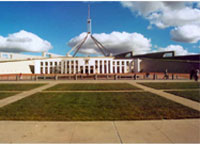This is a shelf course. A shelf course comprises a number of modules related to this broad area of study. Each module is a separate semester of study in this area and is offered in rotation. You can study TWO modules but you cannot study the same module twice.
|
Subject Area: Politics
This course can also be studied in the following specialisations: Australian Studies & International Relations
Module: "Debates" (Semester 2, 2011)
This is a third year seminar course within the Politics major. In particular, it builds on previous student learning in the Australian politics stream of the Politics major. It is designed to examine the complexities around key questions of governance in contemporary Australian politics, in greater depth and in a more concentrated way than previously in the students’ learning experience. A selection of the following key institutions and related debates will be taught – the selection will depend on the course convenor's areas of expertise. The key institutions and related debates are: the parliament and the ‘decline of parliament’ thesis, the Prime Minister and executive and the ‘presidentialisation’ thesis, the public sector and New Public Management, political parties and the ‘cartelisation’ thesis, and the judiciary and ‘judicial activism’.
Module: "Prime Ministers & Leadership"
Popular and media views identify the state and prosperity of Australia with the success or failure of the Prime Minister. But do prime ministers have as much power as is popularly conceived? To answer this question it is necessary to explore how much one individual can achieve when they are dependent on a political party, a cabinet, powerful interest groups, voters, the state of the economy and international relations. Events can present opportunities as well as difficulties for the prime minister. The course explores the style of leadership of each prime minister and how far each has changed or adapted to current political discourse. Most important is the study of the ‘dirty hands’ thesis: that one must dirty one’s hands to get anything done. There is the demand for principles in politics but also the push for pragmatism which can displease many.

